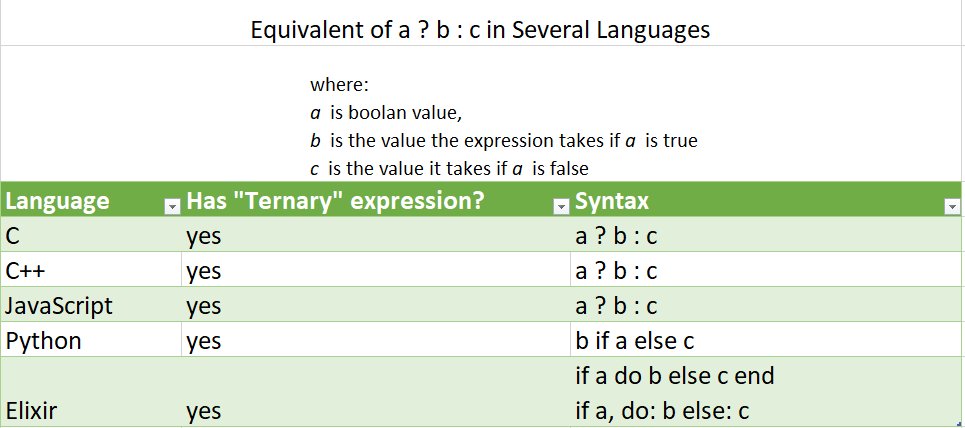Why no ternary expression?
Brandon Gillespie
I'm sure there's a reason, so I figured I'd ask why there isn't a
ternary expression?
It seems like ternary would help with the functional paradigm of
Elixir.
I realize one can use the `if...` as a construct, but it just isn't very readable (imho of course).
Consider:
vs:
Invariably when I come upon a use case for a single-line if, I end up never liking its readability. So instead of the above, I end up with:
While this works, it's also not great, because I try to avoid assignments wherever possible (being a functional language and all).
Anyway, just a question more than anything. Thanks!
-Brandon
A few other things to address suggestions I know may come:
1. "It's too cryptic" — I just need to point to the `&(&1)` type shortcut to show precedence for smaller syntax sugar in elixir.
2. Just make a `ternary()` function — but I don't think it really helps any with the visual readability, and in fact is probably LESS so since it's a less known function/name in the general programming world, where ternary ?: is pretty ubiquitous.
3. use pipes in the above last example — not what I want, because
that requires re-ordering the function's arguments. That's a
bizarre requirement just because we can't handle ternary's.
José Valim
--
You received this message because you are subscribed to the Google Groups "elixir-lang-core" group.
To unsubscribe from this group and stop receiving emails from it, send an email to elixir-lang-co...@googlegroups.com.
To view this discussion on the web visit https://groups.google.com/d/msgid/elixir-lang-core/112d8d35-c65e-4d8d-a221-5707c211f26b%40cold.org.
José Valim
Robert Viragh
avariable = true ? 42 : 43
avariable = true ? 42 : 43 //javascript



42


int main() {
int value = if (true) 42 else 43; // This line will cause a compilation error in C++
std::cout << "Value is: " << value << std::endl;
return 0;
}

#include <iostream>
int main() {
int value = true ? 42 : 43; // value is 43
std::cout << "Value is: " << value << std::endl;
return 0;
}
From this comparison, Elixir is the only language among these three languages that uses if exactly in this way. Using if the same way in any of the other languages would be a syntax error, since the if expresssion in the other languages doesn't itself have a value and can't be used as an rvalue.

--
Greg Vaughn
>
> As a user of Elixir, it seems to me that I can write ternary expressions in Elixir by treating the if statement as an expression and it remains highly readable.
It just so happens that Elixir is the first language where you have encountered it. It's great to see you have a "lightbulb moment" when a new concept fits together in your mind. Google for terms such as "expression based language" for more details.
That being said, yes, this insight offers you a deeper way of looking at conditional logic in Elixir. However, a ternary operator is distinct, as José pointed out, because it is an operator.
-Greg Vaughn
oliver....@googlemail.com
In general, two constructs are more common in our code:
if ... do .. else .. end # inline in any other expression
I still limit the use of the latter one simply because it quickly gets out of hand, but for filling a field in a struct with simple values it can be really useful.
Oliver
